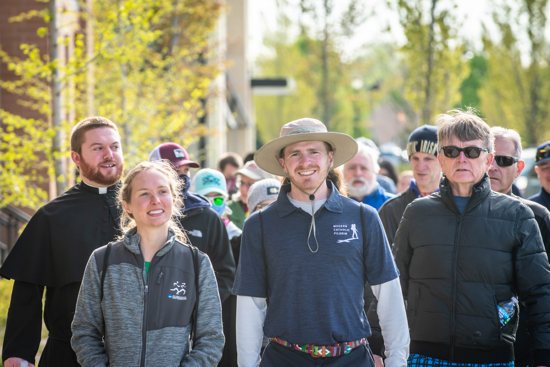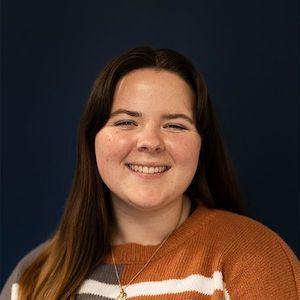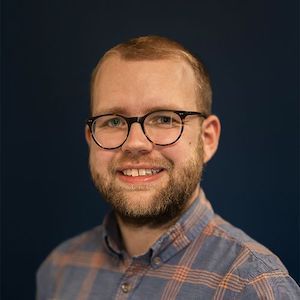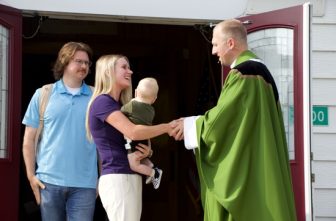
In March 2017, Will Peterson and his friend David Cable stepped out of Peterson’s front door in Lexington, Kentucky, to begin a pilgrimage. Their destination was the Trappist Abbey of Gethsemani, some 70 miles away.
The journey is 75 minutes by car along the Bluegrass Parkway, but the friends didn’t drive. Instead, with backpacks and hiking boots, they walked the route, in rain and shine, relying on strangers’ hospitality along the way.
The experience led to Peterson and Cable in 2019 co-founding Modern Catholic Pilgrim, a Twin Cities-based nonprofit organizing the National Eucharistic Pilgrimage that begins in mid-May. Four groups of pilgrims will travel — mostly by foot — from routes beginning in the north, south, east and west of the country, converging in Indianapolis ahead of the National Eucharistic Congress July 17-21.
The pilgrims will accompany a monstrance displaying the Eucharist the entire way, making their walk somewhat of an eight-week Eucharistic procession through mountains, plains, cities and countryside.
The undertaking is massive, but Peterson — Modern Catholic Pilgrim’s president — said he is working with pilgrimage coordinators in the 65 dioceses the pilgrims will pass through to secure their housing and meals, and to plan special events such as Mass and adoration wherever they stay.
The Archdiocese of St. Paul and Minneapolis in Minnesota, where Peterson now lives with his wife and son, is marking the pilgrims’ weekend in the Twin Cities with a 5-mile procession May 27 from the University of St. Thomas in St. Paul — coincidently home to Modern Catholic Pilgrim’s office — down a historic avenue to the Cathedral of St. Paul, also designated the National Shrine of the Apostle Paul.
Part of the three-year National Eucharistic Revival that is underway, the National Eucharistic Pilgrimage is by far the largest project Peterson and his small team have worked on. The central focus is small pilgrimages — sometimes mere city blocks — that focus on local religious sites, such as parish churches.
Modern Catholic Pilgrim also organizes pilgrimages to established U.S. shrines that commemorate the country’s saints including St. Elizabeth Ann Seton, St. John Neumann and St. Junípero Serra, as well as places that honor the men and women who have saint causes underway, such as Father Augustus Tolton. Pilgrimages in the Twin Cities area have included walks from the Franciscan Brothers of Peace’s Blessed Solanus Friary in St. Paul to St. Michael in Stillwater to celebrate Blessed Solanus Casey on his feast day.
Peterson, 31, knows firsthand the power of a pilgrimage. A native of San Diego, Peterson spent Holy Week 2013 in Rome on a pilgrimage organized by the University of Notre Dame, where he was then an undergraduate. He experienced the tradition of Eucharistic adoration in seven churches on Holy Thursday night, prayed with newly elected Pope Francis at the Colosseum on Good Friday and attended Easter Mass at the Vatican.
“That was really where I encountered the Holy Spirit in a major way,” Peterson said. He is a cradle Catholic, he said, but his Catholicism felt like a cultural expression, not true faith. That changed in Rome.
Despite the week’s late nights and early mornings, “stepping out in the streets of Rome for that Easter Sunday was like lightning coming from my fingertips,” he said.
That energy continued after the trip, as he dove into writings by and about the saints and other influential Catholics, including Catholic Worker movement co-founder Dorothy Day and Gethsemani Trappist monk Father Thomas Merton, who wrote about the idea of what Peterson thinks of as “biblical hospitality,” in which Christians care for each other, including opening their homes for those needing a place to stay.
Peterson connected those ideas to previous “proto-pilgrimages” he had done, like the time he took a train from Chicago to Ottumwa, Iowa, where he spent a weekend, sleeping one night under a tree and the next at the parish church. He planned a similar trip to Rugby, North Dakota, surprising a parish priest with his request for a place to stay. Once the priest understood Peterson’s purpose, he offered a room in the rectory.
“Merton talks about how we’re all naturally wanderers and wayfarers,” Peterson said. Those trips, he acknowledged, were a means of testing out whether biblical hospitality does — or can — exist in the contemporary U.S. Catholic Church. “I was glad to find it there,” he said.
Joe Ruff of The Catholic Spirit contributed to this report
MARIAN ROUTE PERPETUAL PILGRIMS
When the National Eucharistic Pilgrimage gets underway this May, four groups of perpetual pilgrims will depart from the four regions of the U.S. — the North, South, East, and West — before they and thousands of Catholics convene in Indianapolis for the July 17-21 National Eucharistic Congress.
Anyone can join for sections of the pilgrimages, but the designated pilgrims will accompany the Eucharist the entire way on each route. Six laypeople will be perpetual pilgrims on the northern Marian Route, which will begin at the headwaters of the Mississippi River at Lake Itasca in the Diocese of Crookston on Pentecost weekend, May 18-19. The pilgrims — accompanied by two seminarians and two Franciscan Friars of the Renewal among a rotating group of 30 Franciscan Friars — will enter the Archdiocese of St. Paul and Minneapolis at St. Albert in Albertville May 24 and leave the archdiocese at St. Michael in Pine Island May 31.
Organizers of the National Eucharistic Pilgrimage shared biographical information about perpetual pilgrims on each route at eucharisticpilgrimage.org. The laypeople who will be pilgrims on the Marian Route are:
From Santa Clara, California, Schmitz is a junior at The Catholic University of America in Washington, D.C., where she studies theology and philosophy. At CUA she serves in the Office of Campus Ministry as a student minister and worship leader.
Torres serves homeless people, pregnant women, under-resourced families and sex trafficking survivors in Denver. Originally from Mexico City, she is devoted to the Blessed Virgin Mary.
A graduate student in theology at the Pontifical Faculty of the Immaculate Conception in Washington, D.C., Weiss also conducts research there for the Thomistic Institute. Originally from Regensburg, Germany, he immigrated to the U.S. in 2021 for a master’s degree in politics from Hillsdale College, where he focused his research on the political thought of St. Augustine and Pope Benedict XVI.
Heidenreich studies math at the University of Alabama. He directs a math tutoring program for middle schoolers in the Tuscaloosa community, and he is vice president of community outreach for BamaCatholic, the campus ministry component of St. Francis of Assisi University Parish.
Zaleski works as a personal trainer in Illinois, where she also serves the St. Gianna Shrine Ministry at her home parish. “Upon learning about the National Eucharistic Pilgrimage, she felt an intimate and joyful invitation to serve Christ and his Church in this way,” states the pilgrimage website.
Cahill lives in Philadelphia, where she works as a Housing Stability Specialist. This interest was sparked after volunteering as a Christ in the City missionary in Denver for two years. She also coaches swim lessons.
— Anna Wilgenbusch, The Catholic Spirit










